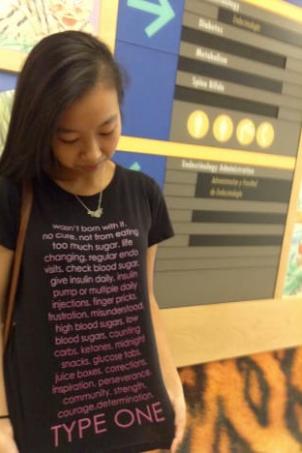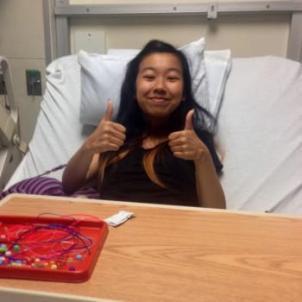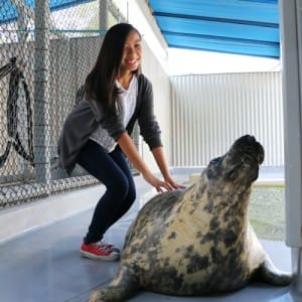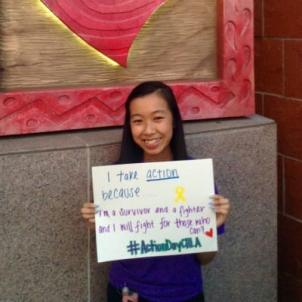Vivian's Can-Do Attitude

When Vivian Bui was 10 years old, she began to get tired a lot. She also started to lose weight and needed to use the restroom constantly. To get some answers, she went to a place she was familiar with as a native of Los Angeles: Children’s Hospital Los Angeles.
There she was diagnosed with type 1 diabetes (T1D), a serious condition in which the pancreas produces little or no insulin. Along with taking insulin through a pump or injection, Vivian had to learn to monitor her blood sugar, count her carbohydrate intake and maintain a healthy weight through exercise and eating sensibly—a lot of responsibility for a 10-year-old.
Over the next three years, Vivian and her family learned to manage her diabetes and found ways for her to continue on the drill team at her elementary school, but her family’s world was about to be turned upside down—again.
“I had a cold, sore throat, runny nose, coughing; but after I treated my cold and got better, my runny nose was still persistent,” says Vivian. “My runny nose soon turned into a stuffed nose and I couldn’t taste or smell anything.”
Her body was telling her something was wrong once again. On top of her diabetes, Vivian was diagnosed with nasopharyngeal carcinoma, a rare cancer that originates in the upper part of the throat, behind the nose.

“After I was diagnosed, I remember a nurse asking if I was scared,” recalls Vivian. “I told her, ‘There are kids younger than me battling cancer or something worse … so if they can do it, I can too.’”
Her can-do attitude helped give her strength, which she needed to help endure the next few months, which included five rounds of chemotherapy, each lasting six days, and 39 rounds of radiation for five days a week, an hour each session.
“Most of the radiation was targeted at my throat,” says Vivian. “So it would hurt to eat, drink and even swallow.” Because of this, a G-tube was inserted in Vivian’s abdomen to help deliver nutrients directly to her stomach.
“A lot of things changed after I was diagnosed with cancer,” says Vivian, now 15. “My family had to put their life on hold just for me, to take care of me. But I’m proud to say that I’m currently in remission.”

But a year into remission, her body began to show signs of distress once more. She was beginning to feel tired and out of breath easily. A bone marrow biopsy showed that her platelet, white blood cell and hemoglobin counts were all low. She was diagnosed with a trio of disorders: minor aplastic anemia, a rare condition in which the body stops producing enough new blood cells; hypothyroidism, in which the thyroid gland does not produce enough thyroid hormone; and vitamin D deficiency. The new diagnoses added to her daily treatment regimen.
“I have to take medicine twice a day, every day,” says Vivian. “I also have an insulin pump, which is always attached to me. I used to be an active girl, but since I bruise easily, I have to be careful and avoid any kind of injury as much as possible. … I’m just like any other normal teen, but I don’t always [get to] do normal teen things.”
But she does make a point of doing some “not normal” teen things, such as give back. Vivian joined CHLA’s Junior Ambassadors, a program that allows local kids to support the hospital’s lifesaving work. She recently raised more than $1,500 for Dreamnight, an event partnership between the Greater Los Angeles Zoo Association and Children’s Hospital Los Angeles.

“Vivian is one of the most admirable patients that I have come across throughout my medical training and practice,” says Maria Lin, MD, Vivian’s endocrinologist. “At a young age, she demonstrates a level of maturity that far surpasses that of her peers…she has continued to persevere and endure the various medical treatments required for her multitude of medial diagnoses. It really is a privilege being able to be a part of her medical team.”
Currently in high school, Vivian has aspirations to become a pediatric oncologist or pediatric oncology nurse and work for CHLA. When asked why, she says, “I know the physical and emotional pain and I’m rooting for every single patient at CHLA to fight and win the battle. Cancer can take away all my physical abilities, but it will not touch my mind, it will not touch my heart, and it will never touch my soul."


